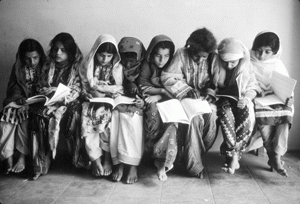In the remote, hilly terrain of northern Thailand, elephants carry educational materials to nearly 1,600 people in 37 villages. They bear books, learning aids, and props such as a video player, a television, and a satellite dish and receiver. Every month the elephants, along with a team of riders, twelve teachers, and four public health workers, travel from village to village to help the locals read and write.

The program may seem arduous, but such efforts are needed to lower illiteracy rates worldwide. According to the United Nations Educational, Scientific, and Cultural Organization (UNESCO), there are currently about 861 million illiterate adults in the world. In response to this staggering number, the UN has declared the next 10 years the UN Literacy Decade. During this period UNESCO will initiate its "International Plan of Action," designed to mobilize national governments, public and private organizations, universities, and local communities to create literacy programs, research who will most benefit from such programs, and find ways to monitor their success so that they can be improved upon and replicated elsewhere. UNESCO has also developed the Non Formal Education Managing Information Systems (NFEMIS) program to find new ways to gather data on the effects of local literacy efforts.
Financial support for the Literacy Decade will come not from UNESCO but from such organizations as the U.S. Agency for International Development (USAID) and the World Bank. The goals of the program echo those expressed by the World Education Forum in Dakar, Senegal, in 2000, where more than 180 countries pledged to increase adult literacy rates by 50 percent by the year 2015.
The theme of the Literacy Decade will change every two years and will include gender, poverty, health, peace, and freedom. "These themes raise awareness about how literacy is linked to other aspects of life," says Ushio Miura, assistant program specialist at UNESCO. "Literacy isn't just about being able to read and write; it has other implications. For example, by enabling people to communicate via newspapers or the Internet, it promotes democracy and ultimately peace. It's a tool for mutual understanding."
In recent years literacy programs around the world have demonstrated these far-reaching benefits. In Brazil a program called Solidarity in Literacy, founded in 1997 through a partnership among the Brazilian government, corporations, universities, and civilians provides a simple, innovative, and low-cost literacy model: Corporations share with the Ministry of Education the cost of literacy courses ($10 per student per month) and regular citizens "adopt" students by contributing $5 per month for one semester—the duration of one student's literacy course. Universities help by training instructors and ensuring the quality of education.
When Solidarity in Literacy started, 11 corporations and 38 universities were involved in teaching 9,200 students in 38 municipalities. By December 2002, 93 corporations and 204 universities had reached out to 3.6 million students in 2,010 municipalities. In addition, more than 150,000 instructors had been trained. UNESCO has voted Brazil's Solidarity in Literacy one of the 10 most successful literacy programs in the world. The program's success is reflected not only in the number of students it has managed to sponsor, but also in the fact that in most participating municipalities, transportation, sanitation, and the availability of electric lighting also improved.
"Literacy is a human right," says Kofi Annan, UN secretary-general. "The fact that twenty percent of the world's adults are deprived of it should fill us all with shame. That is especially true of female literacy." Women constitute two-thirds of the adult illiterate population. But some regions have already begun to address this gender gap.
In the northwestern Rajasthan state of India, illiteracy rates among women were until recently among the highest in the country—estimated at 80 percent (and as high as 88 percent in rural areas). In 1992, a nongovernment organization called Lok Jumbish, or the People's Movement, started providing alternative learning centers for children—particularly girls—who don't have access to education because of geographic, economic, or social factors. Lok Jumbish also establishes women's groups in every village where a literacy program has been implemented and offers professional training for women. So far about 150,000 children (70 percent of whom are girls) have been enrolled in alternative learning centers, and more than 8,400 women's groups have been formed in the villages.
Although such success stories are encouraging examples of what can be accomplished during the Literacy Decade, the UN acknowledges that it can do no more than mobilize countries toward achieving their goals. "UNESCO will continue to support countries in doing what they pledged," says Miura. "But the Literacy Decade will not succeed unless governments and civil societies make it happen."
Dalia Sofer is a freelance writer who lives in New York City.









